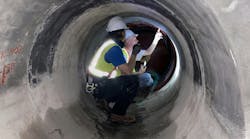There is typically no difference in battery life between automated meter reading (AMR) and advanced metering infrastructure (AMI) systems. There is little reason for utilities to consider battery life when trying to decide which one of these systems is most practical. Instead, they should focus on evaluating the differences in features and capabilities offered by AMI and AMR, and base their selection on which system will help them increase customer service and operational efficiency levels.
By Hassan Ali
Many municipalities are enhancing efficiencies through smart technologies such as automated meter reading (AMR) and advanced metering infrastructure (AMI). However, when deciding between these two competing alternatives, utilities sometimes suffer from the common misconception that AMI metering devices have a lower battery life expectancy than meters in AMR systems as a result of AMI’s transmission of near real-time usage data.
There is typically no difference in battery life expectancy between AMR and AMI systems. In order to explain why, we should first call attention to the fundamental differences in the way the systems communicate water usage information to the utility.
AMI meters typically transmit their stored readings only once a day. In addition, they can be configured to “alert” utilities of outages or potential leaks as they occur, serving as “silent sentinels” that constantly monitor the distribution network to provide near real-time notification of such occurrences. And, should the utility want to receive an “on-demand” reading from a meter while on the phone with a customer, or a move in/out reading request outside of its normal once a day data transmission, the utility can send a signal from the office to the meter to prompt such a reading.
While AMI meters may only transmit once a day, AMR units can transmit as often as 43,200 times a day. Since AMR meters employ one-way communication to send meter readings, they must broadcast frequently to insure utility workers can collect that information with mobile or handheld devices while in proximity of the meters.
Because utilities only receive one reading a month via AMR and one reading every day through AMI, they assume that batteries in AMI metering devices will expire faster. But, because the frequency in which AMR metering devices transmit readings is far greater than AMI, the AMI devices actually consume less energy on a daily basis.
However, most AMR devices have battery configurations that provide enough long-term energy to support their higher frequency of data transmission. As a result, utilities can expect batteries in either system to achieve a full life expectancy of approximately 20 years to match meter replacement intervals.
In conclusion, there is little reason for utilities to consider battery life when trying to decide which one of these systems is most practical. Instead, they should focus on evaluating the differences in features and capabilities offered by AMI and AMR, and base their selection on which system will help them increase customer service and operational efficiency.
WW
About the Author: Hassan Ali is vice president and general manager of Cleveland, NC-based Mueller Systems, a leader in advanced metering solutions for water and energy systems.
More WaterWorld Current Issue Articles
More WaterWorld Archives Issue Articles


